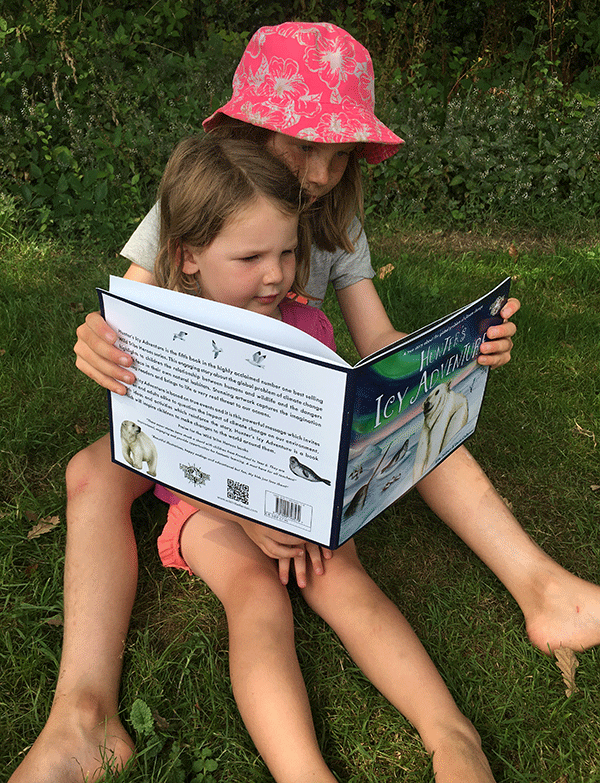The idea of snuggling up with my two curious and nature-loving children and a good book about wildlife or young climate heroes is appealing. But unless their vivid imaginations are captured, my efforts will be wasted.
Since youth climate strikes began, the number of new books for ‘budding eco-warriors’ being published has soared. But they won’t all be bestsellers – some are too dense and fact-heavy, others too abstract, some are just regurgitated articles about Greta, albeit abridged for a younger audience.
I truly believe in the power of books; they can be transformative, sometimes life-changing. But we mustn’t force worthiness on our children. Storytelling is a craft and if readers become transfixed by a book about a turtle entangled by a plastic bag, or empathise with a character saving the orangutans, they might well ponder the wider implications. Teaching kids they can make positive change is an empowering message, but first and foremost it must engage and entertain.
As Jacques Cousteau famously said, “people protect what they love”. From an early age, nurturing this fascination begins with embracing their sense of awe and wonder, not with the heavy burden of existential crisis. If a title screams ‘discover how YOU can look after the planet’ I usually pop it back on the shelf.
Author Sally Gardner agrees that we mustn’t weigh innocent children down. “This is not our children’s problem – we are to blame for this mess. Some books hang guilt on the younger generation, but when children smell morals in books, they close off,” says Gardner, who recently released a story about a cast of miniature characters who have lived in secret on Rubbish Island since before the Vikings.
But as plastic threatens to overwhelm their home, the Tindims make contact with human children for the first time and show them how to transform rubbish into treasure. Inspired by the litter she saw washed up on her local beach near Hastings, The Tindims of Rubbish Island (published by Zephyr, £6.99) presents innovative solutions alongside humour.

Not only does she want to encourage children to rethink litter, she’s keen to influence their grown-ups too: “This is about the parents’ water bottles not the children’s water bottles. The Tindims are absolutely foxed as to what could be in these plastic bottles and they’re amazed to discover it’s water. Perhaps kids can make their parents actually think when they go and buy another water bottle, ‘what am I doing?’”
Plastic is visible and tangible, so it’s an accessible entry point to understanding our environmental impact and the solutions. As the Tindims say: “rubbish today is treasure tomorrow’ and no resource should ever be wasted.”
Environmental advocacy is of great importance to author Cressida Cowell MBE, too. As children’s laureate, she has created a ten-point charter that states that every child has the right to have a planet to read on.
“We human beings are not as in control of our environment as we think we are. We can circumnavigate the globe in a single day, we can go down to the bottom-most depths of the ocean, but one shrug of the earth’s crust, and our mighty cities are shaken to the ground, one hole in the ozone layer, and the icecaps melt. We can chop down our trees, but if we destroy the lungs of the earth, we will eventually destroy ourselves,” says Cowell, who is well-known for the How to Train your Dragon books and the Wizards of Once series (Hachette Children’s Group, £12.99), both of which have a strong environmental theme running throughout.
“A major theme in my Wizards of Once series is the importance of children interacting with nature in a ‘wild’ way. This is more vital than ever,” she explains. Through her writing, she focuses on a time when humans were much more aware of their close connection with the natural world and hopes to encourage adults to think about whether children of today are allowed enough unsupervised access to nature.

While Cowell wants to encourage this ‘explorer spirit’, she worries that future generations might not be able to even describe their environment. “In his book Landmarks Robert Macfarlane explains how the 2007 Oxford Junior Dictionary replaced common words for landscape and nature, such as ‘bluebell’ and ‘kingfisher’ with words considered more useful for children, like ‘broadband’ and ‘blog’.
“So not only are children not playing outdoors enough, but they’re also in danger of losing a precise and extensive vocabulary to describe the natural world around us,” says Cowell, whose latest book features sprites who collect nature words that are in danger of disappearing.
She isn’t the least bit surprised that global climate action is currently being spearheaded by teenage Swedish climate activist Greta Thunberg.
“Children know that the most important problems we face are the environmental challenges,” says Cowell. “While adults often give up when faced with an impossible problem, that doesn’t bother children, and their belief in magic and the impossible just might make it happen.”
Five of the best green children’s books:
Wild Cities by Ben Lerwill and illustrated by Harriet Hobday (Published by Penguin, £12.99) showcases the diversity of animals living in bustling cities around the globe.
The Sea by Miranda Krestovnikoff and Jill Calder (Bloomsbury, £12.99) is a journey through marine habitats that little ocean explorers will love.
Guardians of the Planet by Clive Gifford (Buster Books, £12.99) is colourful, engaging and endorsed by environmental law organisation Client Earth.
Buddy’s Rainforest Rescue by Ellie Jackson (Wild Tribe Heroes, £7.99) is a jungle adventure that highlights issues surrounding palm oil and deforestation and finishes with a happy ending.
Fantastically Great Women Who Saved the Planet by Kate Pankhurst (Bloomsbury, £6.99) is a collection of stories of trailblazing women and what led them into conservation, from the jungles to the poles, written by a descendant from suffragette Emily Pankhurst no less.
Support your local bookshop and buy online via bookshop.org.












0 Comments